Forty-six yrs later, returning to a Musahar village, to find change but desire for more
Women in Piparghatti village still barely go to school, but ensure their children study. They are also clear about what they need and their choice: jobs, and Nitish Kumar
 “Rojgar” is thus a war cry of the 2025 Bihar battle, indicating rumblings of a society in transition. (File Photo)
“Rojgar” is thus a war cry of the 2025 Bihar battle, indicating rumblings of a society in transition. (File Photo) “If I were to tell you that I will take one of your dearest wishes to the Prime Minister and Bihar Chief Minister, what would that be?” I asked a group of women belonging to the Musahar community – one of the most deprived Dalit groups – in Piparghatti village in Gaya district. “Berozgari (unemployment),” replied three of them in unison.
In the neighbouring Barachatti town, which is also an Assembly constituency, I asked an 18-year-old, visiting from a nearby village, the same. Dressed in a bright orange saree that matched the sindoor in her hair parting, the Musahar teenager who has never been to school – like the Piparghatti women – also had a one-word response: “Berozgari”. “Humare bachchon ke liye rozgar dain yahan (They should provide jobs to our children here),” she said.
She got married four months ago, and her husband then left for Chennai, where he works in a packaging factory. The family survives on the money he sends home.
I was visiting the Musahar-dominated Piparghatti village after 46 years, having first come there, soon after cutting my teeth in journalism, to study a peaceful andolan (movement) by the Jayaprakash Narayan-inspired Chatra Yuva Sangharsh Vahini. It had mobilised Musahars in four blocks to seek distribution of land illegally held by a local mutt in Bodh Gaya.
It was my introduction to the all-pervasive caste system in Bihar, but also to abject poverty, the likes of which I had never seen, in which Musahars lived. Placed at the bottom rung of the Scheduled Castes (SCs), they often ate rats for survival (hence their name).
I had stayed overnight at a Manjhi home, and still remember the little kothri where I slept on the bare floor. I also remember the meal the Musahar family had shared with me – generously placing a spoonful of oil on the side of roti and salt, which was their daily fare.
These memories came flooding back as I returned to Piparghatti to gauge the wind blowing in these Bihar elections. There is now a pucca road leading to the village flanked by lush green fields. The mud hut I had slept in is now part-pucca, as are several other houses.
Many children now go to school. A middle school has also come up. But there are several of them still roaming around who are not enrolled in a school. Unlike their articulate counterparts in other parts of Bihar – an 8-year-old in Patna explained to me why he wanted to be an Army General and eventually, the Army Chief – the Musahar children tended to slink away when asked their name. All except a nine-year-old girl, who said she studied in a private school and wanted to be a doctor.
Most of the Musahar women, however, still have never gone to school. As per the 2011 Census, literacy rate among them stood at just 1.43%, as compared to 53.5% for women in Bihar overall, and the national figure of 65.5%. Ask them if they have heard of Nitish Kumar, Narendra Modi and Lalu Prasad, they all respond with a loud “yes”. Though they are not as clear about the positions these leaders hold, there is no confusion about whom they will vote for: Nitish Kumar, for what “he has done for us”, and for the Rs 10,000 already transferred to the accounts of many of them (under the Mukhyamantri Mahila Rozgar Yojana). Those who have not received this money yet are hopeful about getting it soon.
Among Yadav women in Piparghatti too, the scheme is popular. However, they make it clear that they will vote for the RJD, arguing that its leader Tejeshawi Yadav would have “no option but to continue the scheme if he comes to power”.
In various parts of Bihar, several women beneficiaries of this scheme have already branched out after getting the money, selling vegetables or acquiring a cart – just as the aim is of the Rojgar Yojana.
There has been another change since 1979. Thanks to the Sangharsh Vahini campaign, Piparghatti and adjoining villages were among the first in the country where land pattas were given by the government to Musahar women in the early 1980s – a measure then considered “revolutionary”. It is another matter that many of them have since sold their lands for various reasons, including illness, death or marriage.
Those struggles and victories have seeped into the collective consciousness of Bihar over the years, as democracy deepened to empower those on the margins. When Jitan Ram Manjhi, a Musahar (or Bhuiyan as they are also called locally), was named the Bihar Chief Minister in May 2014 by Nitish, it was a historic moment of pride for the community – and for India’s democracy. Nine months later, Jitan Manjhi was forced to step down, following which he went on to float his own party, HAM (Secular), which is currently an NDA ally.
The HAM(S) has got 6 seats under the incumbent NDA’s seat-sharing pact for the Bihar polls, with Manjhi’s daughter-in-law Deepa and her mother Jyoti Devi, both sitting MLAs, contesting from their respective seats, Imamganj and Barachatti. Like RJD supremo Lalu Prasad, Manjhi, who is now a Union minister, has drawn criticism for promoting his family members in politics.
Today, every party has to reckon with the “M” (Mahila) and “D” (Dalit) factors, with their growing political awareness and aspirations making it impossible to ignore them. Parties will have to do better than just making the poll pledge for doles for women, so as to ensure good education for every girl, including those from the Musahar community.
When Tejashwi recently declared, “We need jobs, jobs and jobs”, he too was responding to the ground-level changes. In rally after rally, the Opposition Mahagathbandhan’s 35-year-old CM face has said, “Ab sarkari naukri ke liye taiyar rahiyega (Get ready for a government job now)”, in line with his promise of one government job for every family. Despite his opponents brushing it aside as “absurd”, the public is responding positively to the promise.
But it is poll strategist-turned-politician Prashant Kishor who has played a key role in setting this narrative in Bihar, calling for good education and jobs to stop “palayan (migration)” from the state.
“Rojgar” is thus a war cry of the 2025 Bihar battle, indicating rumblings of a society in transition. November 14, when the poll results will be declared, might tell us more about this story. Is Bihar moving beyond caste as a key determinant of a voter’s choice, and would its youth pivot from “jaat” to “kaam”, as a young Dalit put it? If that happens, it may have a deep impact on the politics of the Hindi heartland including UP.






